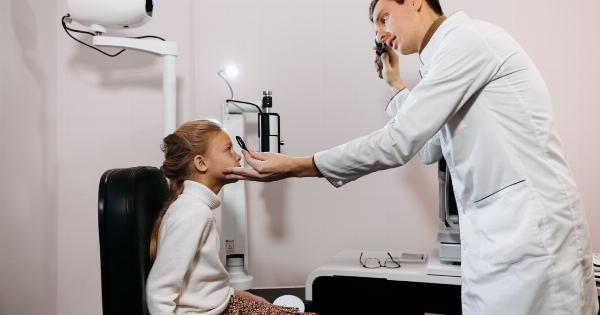It is a common myth that people who sleep with their eyes open are suffering from a serious medical condition.
While it is true that this phenomenon – also known as nocturnal lagophthalmos – can be a sign of an underlying issue, more often than not, it is completely harmless.
What Causes People to Sleep with their Eyes Open?
Nocturnal lagophthalmos can stem from several different factors, including:.
1. Dry Eyes
Dry eyes occur when our eyes don’t produce enough tears or when the tears evaporate too quickly. Certain medical conditions, such as Sjogren’s syndrome, can cause chronic dry eyes.
They can also be a side effect of certain medications, including antihistamines and antidepressants. When our eyes are dry, they become itchy, inflamed, and irritated, leading us to rub them vigorously. This can cause the eyelids to become lax, preventing them from closing all the way, which can result in sleeping with our eyes open.
2. Bell’s Palsy
Bell’s palsy is a condition that causes temporary paralysis or weakness of the muscles on one side of the face. One of the common symptoms of Bell’s palsy is the inability to close one eye, which can lead to nocturnal lagophthalmos.
3. Thyroid Eye Disease
Thyroid eye disease is an autoimmune disorder that affects the tissues surrounding the eyes. It can cause the eyelids to become thick and swollen, making it difficult to close them completely.
4. Eye Surgery or Trauma
If you have undergone eye surgery or suffered an injury that has caused damage to the eye or the surrounding muscles, you may be unable to close your eyes completely while sleeping.
In such cases, the condition is temporary and typically resolves once the eye or muscles heal.
5. Poor Sleep Habits
Some people develop the habit of sleeping with their eyes open, particularly if they sleep on their stomachs or in a face-down position. This can cause their eyelids to remain partially open due to the pressure on the face.
Habitual sleep deprivation or working night shifts can also result in sleeping with the eyes open.
6. Genetics
There is evidence to suggest that sleeping with the eyes open can be hereditary. If you have a close relative who sleeps with their eyes open, you are more likely to experience the phenomenon yourself.
7. Age
As we age, the skin around our eyes becomes thinner, making it harder to keep them closed during sleep.
Additionally, older adults are more likely to experience medical conditions – such as Bell’s palsy or dry eyes – that can cause nocturnal lagophthalmos.
Is Sleeping with Your Eyes Open Dangerous?
In most cases, sleeping with the eyes open is not a cause for concern. However, if it is a new phenomenon for you, or you are experiencing other symptoms – such as eye pain, redness, or discharge – you should consult an eye doctor.
Additionally, if you are experiencing excessive fatigue or sleepiness during the day, you may want to consider consulting a sleep specialist to rule out sleep disorders such as sleep apnea.
How to Manage Sleeping with Your Eyes Open
If you are experiencing nocturnal lagophthalmos, the following tips may help:.
1. Use Eye Drops
If your eyes are dry, lubricating eye drops can help relieve the symptoms. Consult with an eye doctor to determine which type of drops will work best for you.
2. Wear an Eye Mask
Wearing an eye mask while sleeping can help keep your eyes closed, protecting them from irritation and dryness.
3. Try Different Sleep Positions
If you are in the habit of sleeping on your stomach, try sleeping on your back instead. This will help reduce the pressure on your face, allowing your eyelids to close more easily.
4. Treat Underlying Medical Conditions
If your nocturnal lagophthalmos is caused by an underlying medical condition, such as thyroid eye disease or Bell’s palsy, treating the condition can help alleviate the symptoms.
The Bottom Line
While sleeping with your eyes open may seem strange, it is often a completely harmless phenomenon. However, if it is a new development or accompanied by other symptoms, it is best to consult a medical professional.
With proper management and treatment, most cases of nocturnal lagophthalmos can be resolved.






























